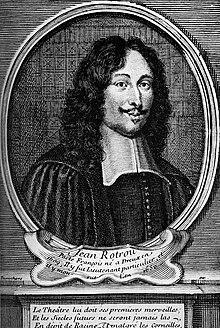Jean Rotrou
Jean Rotrou (born August 21, 1609 in Dreux , † June 28, 1650 in Dreux) was a French poet and playwright.
Life
Rotrou was born in Dreux and studied in his hometown and in Paris. Although he was three years younger than Pierre Corneille , he began his writing career earlier than him. In 1631 he published his first play L'Hypocondriaque , which was dedicated to the Count of Soissons and which inspired Goethe to purple in 1776/77 . From 1632 he was employed as a writer who wrote for the actors of the Hôtel de Bourgogne . His second play, La Bague de l'oubli (1635), partly an adaptation of La sortija del olvido by Lope de Vega , introduced a series of comedies in France based on Spanish models. During this time he often stayed in Le Mans with his patron de Belin, who emerged as an opponent of Corneille in the dispute over Le Cid . 1636 translated Rotrou Amphitruo von Plautus under the title Les Deux Sosies . De Belin died in 1637, in 1639 Rotrou bought the post of local magistrate in Dreux and married the following year.
In the 1640s, Rotrou wrote four of his most successful plays: Le Veritable Saint Genest (performed 1646, printed 1648) about a Christian martyr ; the tragic comedy Don Bertrand de Cabrère (1647); Venceslas (1647; printed 1648) considered his masterpiece in France; and Cosroès (1649), who plays in an oriental setting. A total of 35 plays by Rotrou have been preserved.
When the plague broke out in Dreux in 1650 , Rotrou was no longer able to flee to Paris. He became infected with the disease and died within a few hours. A complete edition of his works was published by Viollet-le-Duc in 1822 .
literature
- Georg Steffens: Jean Rotrou as an imitator of Lope de Vega's. Berlin, 1891
- Kurt Guggenheim : The Holy Comedian (via Le Veritable Saint Genest). Zurich, 1972
Web links
| personal data | |
|---|---|
| SURNAME | Rotrou, Jean |
| BRIEF DESCRIPTION | French poet and playwright |
| DATE OF BIRTH | August 21, 1609 |
| PLACE OF BIRTH | Dreux |
| DATE OF DEATH | June 28, 1650 |
| Place of death | Dreux |
